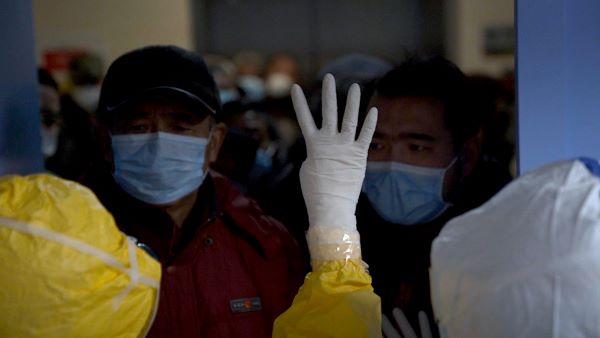

On January 23, 2020, while most of the world had yet to encounter Covid-19, China was already taking quick and extraordinary measures to lock down Wuhan, a city of 11 million people, to contain the newly discovered virus. 76 Days gives audiences an in-depth and vérité-style look into the early days of the pandemic at several Wuhan hospitals. It follows the brave frontline health care workers and patients grappling with what would become an unprecedented global pandemic that has killed more than a million and half and which still rages on.
Directed in collaboration with two Chinese journalists—Weixi Chan and another reporter who chose to remain anonymous—New York–based filmmaker Hao Wu forgoes political and didactic commentary and instead chooses to be a silent spectator, which gives audiences an almost macrocosmic, universalizing picture of ordinary people battling a very in-ordinary and deathly invisible enemy.
Clad from head to toe in layers of protective gear, doctors and nurses work tirelessly around the clock, going from room to room intubating and resuscitating patients, dealing with death certificates, and later on returning the deceased’s belongings to family members. Shifts are 12 hours, and break time is catching a few moments of nap on floors and benches. In addition to grappling with the day-to-day procedures of containing a mysterious and contagious disease, they also act as mediators and quasi-mental health counselors for a restive and vulnerable elderly population.
The film opens unsparingly with a woman yelling “Papa” as her dead father is wheeled away in a body bag. Next, health care workers block an entrance as waves of frightened Wuhan residents try to enter the ward. In another scene, nurses placate an elderly man with possible dementia as he tries to escape the hospital. He eventually breaks down in his hospital bed, hoping to die. Meanwhile, his son calls him, only to give him an unsympathetic, suck-it-up–type of pep talk.
Other than the beginning and end, there is no explainer text to provide context or bios. As Wu himself explained in an interview, 76 Days was intended to go against the grain of statistic-focused commentary and, instead, focus solely on “the human faces of the pandemic.” Wu and his fellow filmmakers nevertheless succeed in capturing the tireless and superhuman efforts of the hospital staff—even if we don’t get to literally see their faces—as they try to lift their and the patients’ spirits by drawing cartoons on their protective gear and making light-hearted conversation. The heavy use of PPE lends the hospital staff a degree of anonymity that highlights their collective heroism.
This is by no means a lighthearted watch. Those who have experienced or have loved ones who’ve succumbed to Covid may find this a bit too close to home. The film is absolutely gut-wrenching and unforgiving. But it may also prove to be an important and educational piece for the archives, hopefully when the pandemic ends and when we can all look back, acknowledge, remember, and commemorate all those health care workers around the world who put themselves in the front lines.
















Leave A Comment